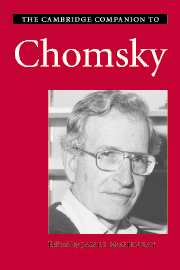Book contents
- Frontmatter
- Introduction
- Part I Chomsky on the human language
- Part II Chomsky on the human mind
- Part III Chomsky on values and politics
- 11 Market values and libertarian socialist values
- 12 The individual, the state, and the corporation
- 13 Noam Chomsky: the struggle continues
- 14 The responsibility of the intellectual
- Notes
- References
- Index
12 - The individual, the state, and the corporation
from Part III - Chomsky on values and politics
Published online by Cambridge University Press: 28 May 2007
- Frontmatter
- Introduction
- Part I Chomsky on the human language
- Part II Chomsky on the human mind
- Part III Chomsky on values and politics
- 11 Market values and libertarian socialist values
- 12 The individual, the state, and the corporation
- 13 Noam Chomsky: the struggle continues
- 14 The responsibility of the intellectual
- Notes
- References
- Index
Summary
Structures of governance tend to coalesce around domestic power, in the last few centuries, economic power.
(Chomsky 1996d: 178)Introduction
This chapter explores Chomsky’s political morality by focusing on his ideas about the individual, the corporation, and the state. This presentation is no substitute for reading Chomsky himself. His propositions become far more convincing upon studying the historical record he has assembled, a dismaying collection which reveals how the actions and rationalizations of the ruling class are remarkably predictable (at least by the standards of any social science).
I will follow Chomsky’s approach of focusing on the United States to understand the interlocking relationships between state and private power. For more than three decades, he has relentlessly pursued the task of documenting the American political system’s effects on its own citizenry and other nations. He provides so many facts to support his claims and verify his predictions that even the reader who ultimately rejects his analysis is likely to emerge less than enthralled with most American foreign and domestic policies and more skeptical of how government officials and the media present these decisions to the public. For instance, the idea of an idealistic, naïve United States easily manipulated by ruthless, clever foreigners is a sentimental myth. Far closer to the truth is the fear Simon Bolivar expressed in 1822: “There is at the head of this great continent a very powerful country, very rich, very warlike, and capable of anything” (cited in Chomsky 1993d: 142; see also Wilson 2002).
- Type
- Chapter
- Information
- The Cambridge Companion to Chomsky , pp. 240 - 259Publisher: Cambridge University PressPrint publication year: 2005
- 2
- Cited by

